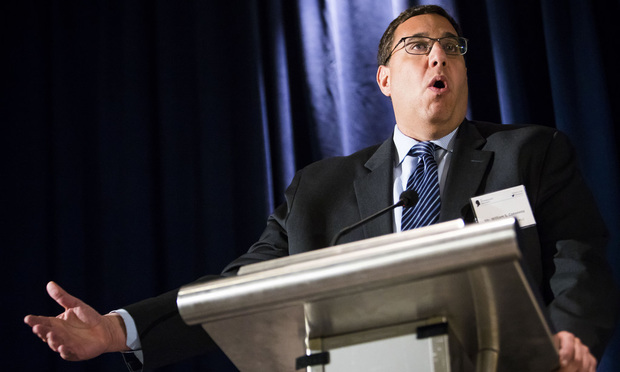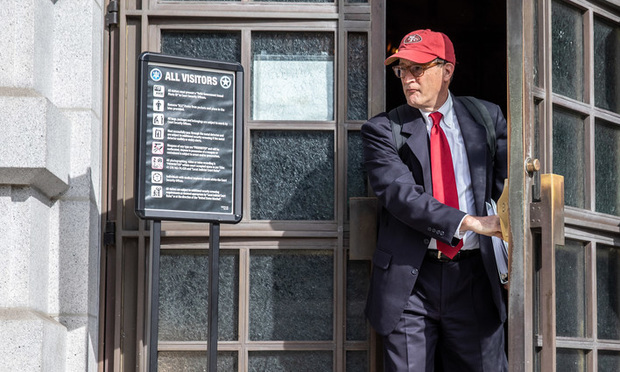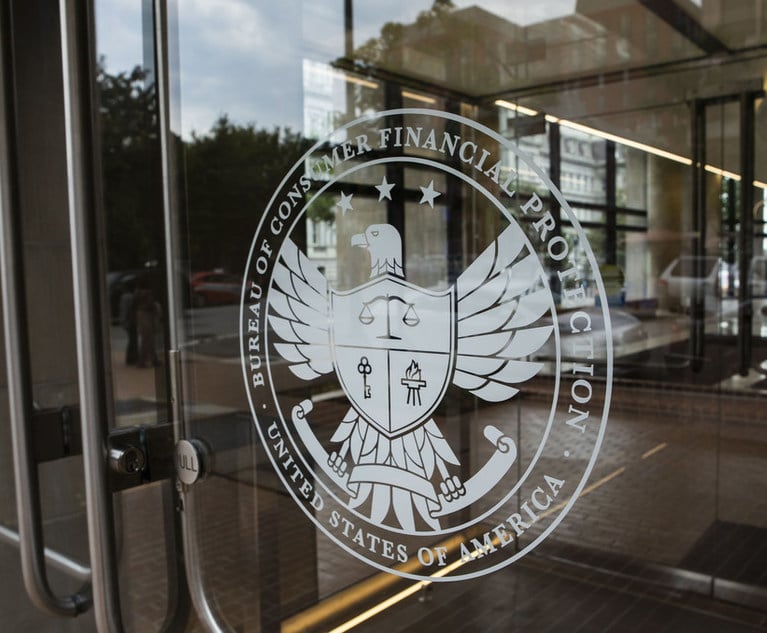US Supreme Court Blocks House Subpoena Seeking Trump Financial Records
The U.S. Supreme Court set a noon Dec. 5 deadline for the filing of a petition from Trump's lawyers.
November 25, 2019 at 06:41 PM
5 minute read
 William S. Consovoy. Photo: Diego M. Radzinschi/ALM
William S. Consovoy. Photo: Diego M. Radzinschi/ALM
The U.S. Supreme Court, handing President Donald Trump an early victory in his quest to keep his financial records secret, on Monday blocked enforcement of a U.S. House committee subpoena that two lower courts had said was lawfully issued to the president's accounting firm Mazars USA.
The ruling marked the first time the high court squarely addressed Trump's financial records, and the order provides an early indication of how the justices could view the major separation-of-powers issue at the center of the dispute and others that are are certain to reach the court soon.
The unsigned order, issued Monday evening, put the House Oversight Committee's subpoena on hold until Trump's lawyers file a petition challenging the merits of a federal appellate court ruling that upheld the subpoena against Mazars. The court set a noon Dec. 5 deadline for the filing of a petition.
"Should the petition for a writ of certiorari be denied, this stay shall terminate automatically," the court said in its order. "In the event the petition for a writ of certiorari is granted, the stay shall terminate upon the issuance of the judgment of this court."
Five justices are needed to grant an emergency application asking the court to put on hold a lower court ruling. Granting such a request doesn't automatically mean the court will agree to take up the merits of the dispute, which, instead, only takes the votes of four justices.
 Douglas Letter, general counsel to the U.S. House of Representatives. Photo: Jason Doiy/ALM
Douglas Letter, general counsel to the U.S. House of Representatives. Photo: Jason Doiy/ALMIn granting the stay, the Supreme Court in effect rejected arguments by House general counsel Douglas Letter that there was no basis for additional delay in enforcing the subpoena, which had been upheld by the U.S. Court of Appeals for the D.C. Circuit. Letter is assisted by lawyers from the Washington firm Robbins, Russell, Englert, Orseck, Untereiner & Sauber.
Letter, in his response to Trump's push for an emergency hold, had argued that two levels of the federal judiciary had upheld that subpoena as valid and enforceable under Supreme Court precedents. "Each concluded that the committee issued the subpoena in furtherance of a valid legislative purpose and that the subpoena seeks documents relevant to a subject about which Congress could enact legislation," Letter wrote.
But Trump's lawyer, Consovoy McCarthy partner William Consovoy, told the justices in a court filing that the committee's investigation of Trump for wrongdoing was not a legitimate legislative purpose but instead was "an attempt to exercise a law-enforcement power beyond Congress's legislative purview."
Consovoy warned, "Given the temptation to dig up dirt on political rivals, intrusive subpoenas into personal lives of presidents will become our new normal in times of divided government—no matter which party is in power."
The subpoena stemmed from testimony by Trump former attorney Michael Cohen during the House committee's hearing in February. Cohen alleged that Trump had inflated and deflated his assets on personal financial statements to obtain a bank loan and to reduce his New York real estate taxes and insurance premiums.
In the D.C. Circuit, two Trump-appointed judges—Neomi Rao and Gregory Katsas—had urged their colleagues to review a panel decision, issued in October, that said Trump's accounting firm must respond to the House subpoena for eight years of information.
The panel, with Rao dissenting, said the House had a legitimate legislative purpose in seeking the tax records because "it seeks information important to determining the fitness of legislation to address potential problems within the executive branch and the electoral system; it does not seek to determine the president's fitness for office."
Trump's emergency application to block the House subpoena arrived at the high court less than 24 hours after Trump's personal lawyer, Jay Alan Sekulow, along with Consovoy, filed a petition for review challenging a Second Circuit decision upholding a subpoena from Manhattan district attorney Cyrus Vance Jr. for the president's financial records in connection with a state grand jury investigation. That subpoena was also issued to Mazars.
The grand jury is examining allegations that the president paid hush money to two women through his former lawyer Cohen prior to the 2016 election. The appellate court rejected Trump's argument that he enjoyed absolute immunity.
The Trump administration's Justice Department filed an amicus brief arguing that the Second Circuit was wrong to treat a subpoena for a president's personal records no differently than any other subpoena.
"The decision below resolves grave and important questions regarding Article II and the Supremacy Clause" wrote U.S. Solicitor General Noel Francisco in urging the justices to grant review. "It upholds a state criminal subpoena that has no historical precedent. And it poses a serious threat to the autonomy of the Office of the President of the United States."
Read more:
Judge Says Donald McGahn Must Comply With House Subpoena for His Testimony
Don't Delay Enforcing Trump Tax Subpoena, House Tells Supreme Court
John Roberts' Supreme Court Just Got Its First Trump Tax Returns Case
A Judge Didn't Sound Eager to Throw Out House Suit Seeking Trump Tax Returns
Who Is Trevor McFadden? Meet the Judge Assigned the Trump Tax Returns Case
Carl Nichols Is Assigned to Trump's Bid to Keep NY Tax Returns Secret
This content has been archived. It is available through our partners, LexisNexis® and Bloomberg Law.
To view this content, please continue to their sites.
Not a Lexis Subscriber?
Subscribe Now
Not a Bloomberg Law Subscriber?
Subscribe Now
NOT FOR REPRINT
© 2025 ALM Global, LLC, All Rights Reserved. Request academic re-use from www.copyright.com. All other uses, submit a request to [email protected]. For more information visit Asset & Logo Licensing.
You Might Like
View All
CFPB Resolves Flurry of Enforcement Actions in Biden's Final Week

Wells Fargo and Bank of America Agree to Pay Combined $60 Million to Settle SEC Probe

Supreme Court May Limit Federal Prosecutions Over 'Misleading' but True Statements

CFPB Alleges Berkshire Hathaway Subsidiary Originated Unaffordable Housing Loans
Trending Stories
- 1NJ Supreme Court Clarifies Affidavit of Merit Requirement for Doctor With Dual Specialties
- 2Whether to Choose State or Federal Court in a Case Involving a Franchise?
- 3Am Law 200 Firms Announce Wave of D.C. Hires in White-Collar, Antitrust, Litigation Practices
- 4K&L Gates Files String of Suits Against Electronics Manufacturer's Competitors, Brightness Misrepresentations
- 5'Better of the Split': District Judge Weighs Circuit Divide in Considering Who Pays Decades-Old Medical Bill
Who Got The Work
J. Brugh Lower of Gibbons has entered an appearance for industrial equipment supplier Devco Corporation in a pending trademark infringement lawsuit. The suit, accusing the defendant of selling knock-off Graco products, was filed Dec. 18 in New Jersey District Court by Rivkin Radler on behalf of Graco Inc. and Graco Minnesota. The case, assigned to U.S. District Judge Zahid N. Quraishi, is 3:24-cv-11294, Graco Inc. et al v. Devco Corporation.
Who Got The Work
Rebecca Maller-Stein and Kent A. Yalowitz of Arnold & Porter Kaye Scholer have entered their appearances for Hanaco Venture Capital and its executives, Lior Prosor and David Frankel, in a pending securities lawsuit. The action, filed on Dec. 24 in New York Southern District Court by Zell, Aron & Co. on behalf of Goldeneye Advisors, accuses the defendants of negligently and fraudulently managing the plaintiff's $1 million investment. The case, assigned to U.S. District Judge Vernon S. Broderick, is 1:24-cv-09918, Goldeneye Advisors, LLC v. Hanaco Venture Capital, Ltd. et al.
Who Got The Work
Attorneys from A&O Shearman has stepped in as defense counsel for Toronto-Dominion Bank and other defendants in a pending securities class action. The suit, filed Dec. 11 in New York Southern District Court by Bleichmar Fonti & Auld, accuses the defendants of concealing the bank's 'pervasive' deficiencies in regards to its compliance with the Bank Secrecy Act and the quality of its anti-money laundering controls. The case, assigned to U.S. District Judge Arun Subramanian, is 1:24-cv-09445, Gonzalez v. The Toronto-Dominion Bank et al.
Who Got The Work
Crown Castle International, a Pennsylvania company providing shared communications infrastructure, has turned to Luke D. Wolf of Gordon Rees Scully Mansukhani to fend off a pending breach-of-contract lawsuit. The court action, filed Nov. 25 in Michigan Eastern District Court by Hooper Hathaway PC on behalf of The Town Residences LLC, accuses Crown Castle of failing to transfer approximately $30,000 in utility payments from T-Mobile in breach of a roof-top lease and assignment agreement. The case, assigned to U.S. District Judge Susan K. Declercq, is 2:24-cv-13131, The Town Residences LLC v. T-Mobile US, Inc. et al.
Who Got The Work
Wilfred P. Coronato and Daniel M. Schwartz of McCarter & English have stepped in as defense counsel to Electrolux Home Products Inc. in a pending product liability lawsuit. The court action, filed Nov. 26 in New York Eastern District Court by Poulos Lopiccolo PC and Nagel Rice LLP on behalf of David Stern, alleges that the defendant's refrigerators’ drawers and shelving repeatedly break and fall apart within months after purchase. The case, assigned to U.S. District Judge Joan M. Azrack, is 2:24-cv-08204, Stern v. Electrolux Home Products, Inc.
Featured Firms
Law Offices of Gary Martin Hays & Associates, P.C.
(470) 294-1674
Law Offices of Mark E. Salomone
(857) 444-6468
Smith & Hassler
(713) 739-1250










